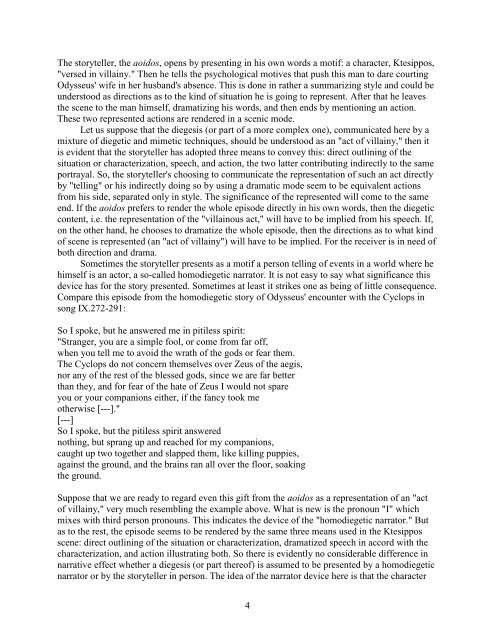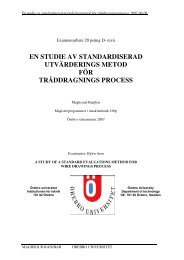Stories in Disguise: On Odysseus' Ithacan Lies and Their Relevance ...
Stories in Disguise: On Odysseus' Ithacan Lies and Their Relevance ...
Stories in Disguise: On Odysseus' Ithacan Lies and Their Relevance ...
Create successful ePaper yourself
Turn your PDF publications into a flip-book with our unique Google optimized e-Paper software.
The storyteller, the aoidos, opens by present<strong>in</strong>g <strong>in</strong> his own words a motif: a character, Ktesippos,<br />
"versed <strong>in</strong> villa<strong>in</strong>y." Then he tells the psychological motives that push this man to dare court<strong>in</strong>g<br />
<strong>Odysseus'</strong> wife <strong>in</strong> her husb<strong>and</strong>'s absence. This is done <strong>in</strong> rather a summariz<strong>in</strong>g style <strong>and</strong> could be<br />
understood as directions as to the k<strong>in</strong>d of situation he is go<strong>in</strong>g to represent. After that he leaves<br />
the scene to the man himself, dramatiz<strong>in</strong>g his words, <strong>and</strong> then ends by mention<strong>in</strong>g an action.<br />
These two represented actions are rendered <strong>in</strong> a scenic mode.<br />
Let us suppose that the diegesis (or part of a more complex one), communicated here by a<br />
mixture of diegetic <strong>and</strong> mimetic techniques, should be understood as an "act of villa<strong>in</strong>y," then it<br />
is evident that the storyteller has adopted three means to convey this: direct outl<strong>in</strong><strong>in</strong>g of the<br />
situation or characterization, speech, <strong>and</strong> action, the two latter contribut<strong>in</strong>g <strong>in</strong>directly to the same<br />
portrayal. So, the storyteller's choos<strong>in</strong>g to communicate the representation of such an act directly<br />
by "tell<strong>in</strong>g" or his <strong>in</strong>directly do<strong>in</strong>g so by us<strong>in</strong>g a dramatic mode seem to be equivalent actions<br />
from his side, separated only <strong>in</strong> style. The significance of the represented will come to the same<br />
end. If the aoidos prefers to render the whole episode directly <strong>in</strong> his own words, then the diegetic<br />
content, i.e. the representation of the "villa<strong>in</strong>ous act," will have to be implied from his speech. If,<br />
on the other h<strong>and</strong>, he chooses to dramatize the whole episode, then the directions as to what k<strong>in</strong>d<br />
of scene is represented (an "act of villa<strong>in</strong>y") will have to be implied. For the receiver is <strong>in</strong> need of<br />
both direction <strong>and</strong> drama.<br />
Sometimes the storyteller presents as a motif a person tell<strong>in</strong>g of events <strong>in</strong> a world where he<br />
himself is an actor, a so-called homodiegetic narrator. It is not easy to say what significance this<br />
device has for the story presented. Sometimes at least it strikes one as be<strong>in</strong>g of little consequence.<br />
Compare this episode from the homodiegetic story of <strong>Odysseus'</strong> encounter with the Cyclops <strong>in</strong><br />
song IX.272-291:<br />
So I spoke, but he answered me <strong>in</strong> pitiless spirit:<br />
"Stranger, you are a simple fool, or come from far off,<br />
when you tell me to avoid the wrath of the gods or fear them.<br />
The Cyclops do not concern themselves over Zeus of the aegis,<br />
nor any of the rest of the blessed gods, s<strong>in</strong>ce we are far better<br />
than they, <strong>and</strong> for fear of the hate of Zeus I would not spare<br />
you or your companions either, if the fancy took me<br />
otherwise [---]."<br />
[---]<br />
So I spoke, but the pitiless spirit answered<br />
noth<strong>in</strong>g, but sprang up <strong>and</strong> reached for my companions,<br />
caught up two together <strong>and</strong> slapped them, like kill<strong>in</strong>g puppies,<br />
aga<strong>in</strong>st the ground, <strong>and</strong> the bra<strong>in</strong>s ran all over the floor, soak<strong>in</strong>g<br />
the ground.<br />
Suppose that we are ready to regard even this gift from the aoidos as a representation of an "act<br />
of villa<strong>in</strong>y," very much resembl<strong>in</strong>g the example above. What is new is the pronoun "I" which<br />
mixes with third person pronouns. This <strong>in</strong>dicates the device of the "homodiegetic narrator." But<br />
as to the rest, the episode seems to be rendered by the same three means used <strong>in</strong> the Ktesippos<br />
scene: direct outl<strong>in</strong><strong>in</strong>g of the situation or characterization, dramatized speech <strong>in</strong> accord with the<br />
characterization, <strong>and</strong> action illustrat<strong>in</strong>g both. So there is evidently no considerable difference <strong>in</strong><br />
narrative effect whether a diegesis (or part thereof) is assumed to be presented by a homodiegetic<br />
narrator or by the storyteller <strong>in</strong> person. The idea of the narrator device here is that the character<br />
4

















